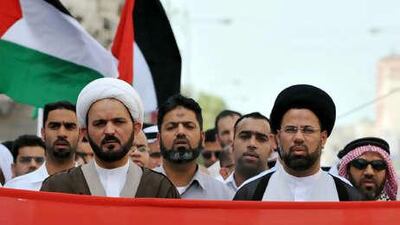MANAMA // Bahrain stripped the citizenship of an influential Shiite cleric with ties to Iraq, as the authorities widened a campaign against dissidents alleged to have sought to overthrow the government. The authorities revoked the passports of Ayatollah Hussein al Najati and his family in an announcement made late Sunday night.
Ayatollah al Najati is one of Bahrain's leading Shiite scholars and his voice carries great weight in political affairs. He is the Bahrain representative of Iraq's Grand Ayatollah Ali al Sistani, the country's most influential Shiite political cleric. He has spoken out about the clampdowns and was a signatory to a recent appeal by key Shiite clergymen calling for a halt to the crackdown, the release of the detainees, and the opening of dialogue between the government and the opposition. But any direct role he might have had in the unrest is unclear, opposition figures say.
The government's action follows a series of tough measures against activists among the Shiite majority, who have religious and cultural ties to both Iraq and Iran, and make up the largest bloc in the opposition. "We were surprised by the inappropriate and provocative way in which this matter was handled," said Sheikh Abdullah Saleh, the deputy secretary general of Islamic Action Society (Amal), the second largest Shiite opposition group.
"We question the selectiveness in implementing the laws," Mr Saleh said in an interview. "The situation is very tense and the role of the wise is not to add oil to flame but to seek ways to resolve these issues." Bahrain on Sunday also barred another Shiite scholar, Sheikh Abdul Jaleel al Miqdad, from delivering Friday prayer sermons for two weeks, saying the sermons disturbed civil peace. The authorities were quick to point out that the decision in both cases were in accordance with the laws.
The move against Ayatollah al Najati, his wife and three children followed a routine review, said the undersecretary for immigration and passport affairs, Sheikh Rashid bin Khalifa al Khalifa. He said that if Ayatollah al Najati and his family want to get a Bahraini passport, they should re-apply and follow procedures. He was born in Bahrain, however his family is of Iranian decent. Before getting a permanent Bahraini passport in the early part of this decade, he travelled using a temporary passport.
In the 1970s, he travelled between Najaf, Iraq, and Iran to complete his religious studies. He returned to Bahrain for a brief stay in the early 1980s, but was barred from re-entering the country during civil unrest that overtook the country. Ayatollah al Najati's office and the leading Shiite opposition grouping, Al Wefaq, declined to comment yesterday. The opposition remains divided over whether to boycott or participate in the elections on October 23.
Bahraini authorities began a series of tough security measures on August 13, arresting a ring alleged to have been planning to overthrow the government and destabilise the country by carrying out terrorist acts. More than 250 Shiites have been detained since mid-August and Bahrain has accused 23 political activists and others of plotting to overthrow the government. Last week, Bahrain also shuttered the semi-independent Human Rights Society and replaced its board of directors. The moves have met with overwhelming support by governments throughout the Gulf.
mmahdi@thenational.ae

